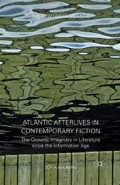Abstract
In this chapter I want to explore some early warnings of the end times we have just been contemplating writ large, on a global scale, in Cormac McCarthy’s The Road and confined to a single remote island in Golding’s The Lord of the Flies. McCarthy’s depiction of a post-apocalyptic descent into the most atrocious brutality and Golding’s staging of an out-of-the-way reversion to barbarism both present human sociality in radical decline. To understand what might be presently facilitating this decline, as well as what might resist it, I want to turn to two novels of the early 1990s, Miss Smilla’s Feeling for Snow by Peter Hoeg and The Shipping News by Annie Proulx. In these novels, sociality is in dire straits but of a different order. Subject to the dispersing or redistributing effects of global capital, humanity is on the verge of becoming abstracted from the place of its greatest effectiveness: the local. Both novels are set in contemporary society where, according to Hartman, “artificial, bureaucratic, or secondary mechanisms are blocking sources of vitality” (27). We have seen that what struggles to survive against all odds in McCarthy’s The Road is the most immediate gesture of kindness and care, the nurturing and safeguarding of the young. In Hoeg’s novel, this level of care is relegated to the status of an irrelevancy by all except the protagonist, Smilla.
Access this chapter
Tax calculation will be finalised at checkout
Purchases are for personal use only
Preview
Unable to display preview. Download preview PDF.
Notes
See Claire Colebrook, Understanding Deleuze (London: Allen and Unwin, 2002), p. xlii. “We need to do away with the idea that … man decides his being,” Colebrook explains, “for it is less the case that we decide who ‘we’ are than that forces ‘decide’ us.” See also Jonathan Roffe, “Exteriority/Interiority,” in The Deleuze Dictionary Revised Edition (Edinburgh: Edinburgh University Press, 2010), p. 97. Roffe explains that Deleuze’s critique of interiority means “there is no natural interiority (conscious willing, for example) involved in human subjectivity.”
Like Roffe’s reading of Deleuze, DeLanda rejects interiority though he favours a useful distinction between the properties of “a given entity” and its capacities. The distinction may be a little arbitrary but it does allow us to give a name to and think about agency as a result of the potentially immeasurable difference between “the properties defining a given entity [and] its capacities to interact with other entities” (10). Manuel DeLanda, A New Philosophy of Society: Assemblage Theory and Social Complexity (London: Continuum, 2006).
“This crisis arose partly due to technological advancements: echo-sounding to find the fish, drag nets to trawl the ocean (resulting in vast amounts of overkill, with immature fish being thrown back, dead, into the ocean), efficient boats that could travel farther and faster, and the development of the factory-freezer ship. Compounding the problem, the Ottawa government tended to overestimate the number of fish and how quickly stocks could be replenished, while also allocating quotas based on economic rather than ecological criteria. Lack of regulation until 1977—the year in which Canada restricted foreign fishing around most of the island—meant that large overseas fleets were free to exploit. ‘Extractice’ practices, the Frankenstein effect of technology run riot; distant, sometimes ill-informed, administrators; and large-scale international profiteering were, thus, all key to the crisis.” Dervila Cooke, “Tradition, Modernity, and the Enmeshing of Home and Away: The Shipping News and Proulx’s 1990s Newfoundland,” Studies in Canadian Literature 38.1 (2013): 190–209, at p. 200.
By “contact zone” Mary Pratt is referring to “the space in which peoples geographically and historically separated come into contact with each other and establish ongoing relations, usually involving conditions of coercion, radical inequality, and intractable conflict.” Mary Louise Pratt, Imperial Eyes: Travel Writing and Transculturation (New York: Routledge, 1992), p. 313.
Copyright information
© 2016 Sofia Ahlberg
About this chapter
Cite this chapter
Ahlberg, S. (2016). Through a Border Darkly. In: Atlantic Afterlives in Contemporary Fiction. The New Urban Atlantic. Palgrave Macmillan, New York. https://doi.org/10.1057/9781137479228_4
Download citation
DOI: https://doi.org/10.1057/9781137479228_4
Publisher Name: Palgrave Macmillan, New York
Print ISBN: 978-1-349-69360-3
Online ISBN: 978-1-137-47922-8
eBook Packages: Literature, Cultural and Media StudiesLiterature, Cultural and Media Studies (R0)

